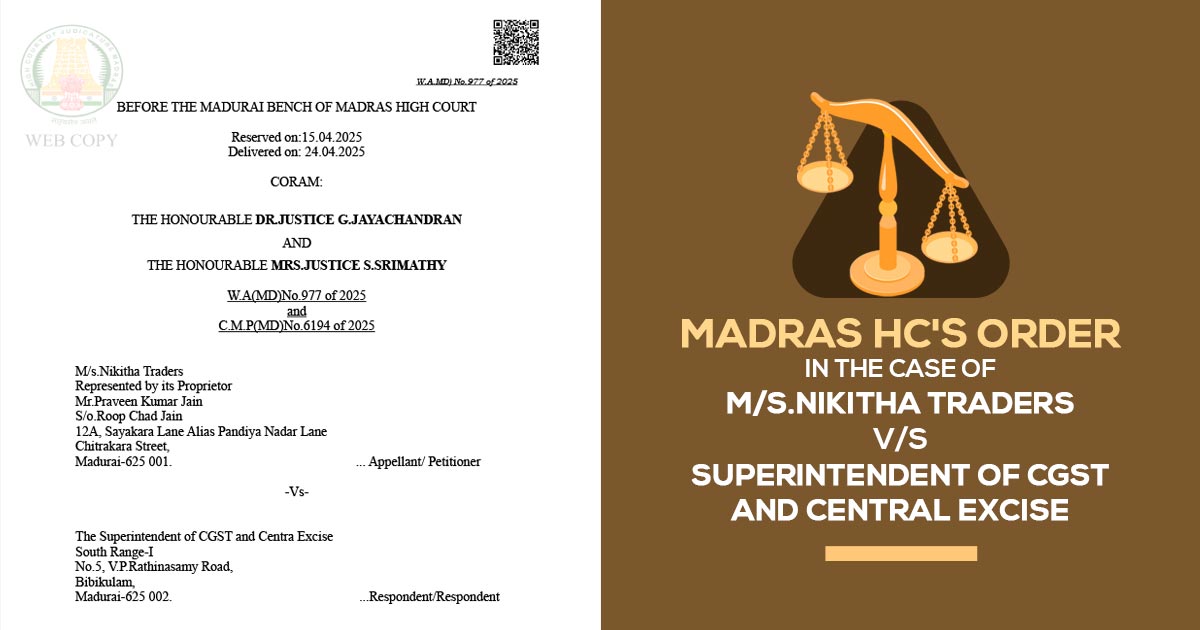
In a development concerning GST compliance and judicial remedies, a writ petition filed by M/s Nikitha Traders, challenging a demand and penalty order issued by the Central Goods and Services Tax (CGST) authorities, has been dismissed by the Madurai Bench of the Madras High Court.
The court recommended appellant pursue the available statutory appellate route, supporting the principle that alternate remedies should be exhausted before invoking writ jurisdiction.
The ruling delivered by a Division Bench including Dr. Justice G. Jayachandran and Justice S. Srimathy, related to W.A.(MD) No. 977 of 2025, filed by M/s Nikitha Traders, a proprietary concern represented by Mr. Praveen Kumar Jain. The appeal contested the dismissal of a previous writ petition (W.P.(MD) No. 6487 of 2025) by a single judge of the High Court.
The Case
An assessment order dated 28.01.2025 was issued by the CGST Superintendent, South Range-I, Madurai, raising a demand of ₹13.24 lakh against the trader. Due to the mismatch, the demand has emerged in the ITC between the GSTR-3B returns filed and the auto-populated GSTR-2A data. Also, u/s 122(2)(a) read with Section 73(9) of the CGST Act, 2017, a penalty of ₹1.30 lakh and interest of ₹12,255 were charged pertinent with the provisions of the IGST Act.
Mismatch was an error from the wrong return filing and is to be considered as rectifiable, Nikitha Traders argued. Appellant has furnished a response with the related documents of discrepancy, though alleged that no chance is proposed by the authorities to improve the error before passing the order.
Observations of the Court
The court, the original assessment order, had duly acknowledged the response of the taxpayer and recorded the reasons for rejecting the explanation. It was outlined by the bench that the CGST Act furnsihes a precise appellate remedy under section 107, which the appellant is unable to pursue before approaching the HC.
As there is the availability of a statutory alternative, the writ petition is not to be entertained till breach of natural justice or absence of jurisdiction is there, the court said. The unfollowing obligation of appeal filing to avoid a 10% pre-deposit of the disputed tax and penalty was seen as an attempt to bypass the said procedure by the appellant.
An Overview of Precedents
While the appellant relied on earlier rulings, comprising TVl. Thendral Electricals case and an SLP in the Aberdare Technologies matter, the facts of the case were distinguishable, the court said. The bench admitted the correct conclusion of the CGST authority that a substantive error is the reason for the ITC mismatch that required adjudication through appeal.
The Relief has Been Granted
The court, while dismissing the writ appeal, extended the time for the appellant to submit a statutory appeal by 15 days, assuring the right to appeal is not extinguished. If the appeal has been submitted in the extended period and disposed of on merits within three months, then the appellate authority can entertain the appeal, the court asked.
Read Also:- Madras HC Grants Relief to Gas Distributor After Income Tax Notice Missed Due to Email Change
Verdict Importance
The stance of the judiciary has been supported by the ruling that the process of statutory appeal under the GST law should be used before invoking the extraordinary writ jurisdiction. It specifies the significance of the timely rectification and compliance with the process of filing a return under the GST regime.
The writ appeal has been dismissed and allowed a statutory appeal; it will see the working of the appellate authority with the ITC mismatch issues, and whether the trader could make grounds for the reversal of the penalty and tax demand.
| Case Title | M/s.Nikitha Traders V/S Superintendent of CGST and Central Excise |
| Case No. | W.A.MD) No.977 of 2025 |
| Counsel For Appellant | M/s.Vishnu Priya |
| Counsel For Respondent | Mr. R. Gowri Shankar Sr.St.C |
| Madras High Court | Read Order |









